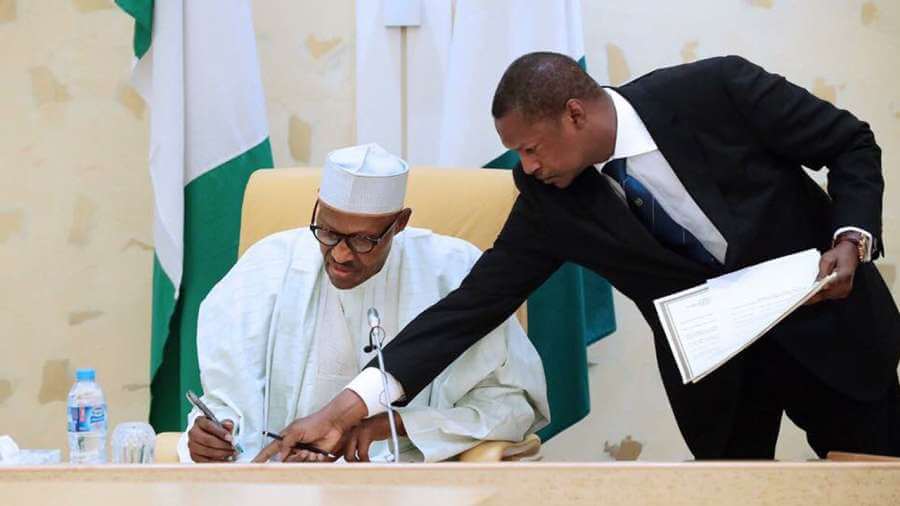As government implements Oronsaye’s report
Prospects that the reform of the Nigerian public service towards the long-expected reduction in size and cost of governance may commence with the 2023 budget, came to the fore last week when the Chairman of the Senate Committee on Finance, Solomon Olamilekan Adeola, mooted the eventuality at a meeting with MDAs in the course of […]

Prospects that the reform of the Nigerian public service towards the long-expected reduction in size and cost of governance may commence with the 2023 budget, came to the fore last week when the Chairman of the Senate Committee on Finance, Solomon Olamilekan Adeola, mooted the eventuality at a meeting with MDAs in the course of the review of the 2023 -2025 Medium Term Economic Framework (METF).
The meeting, whose theme was on ways and means of increasing government revenue, offered the setting for Adeola’s submission that over 400 out of the existing 541 MDAs of the federal government are designated to be scrapped for being waste pipes.
Forex scarcity: Banks suspend international transactions on naira debit cards
Of teachers and abuse of power
This restructuring constitutes a critical recommendation by a committee set up on April 18, 2011, by former President Goodluck Jonathan on Restructuring and Rationalisation of Federal Government Parastatals, Commissions and Agencies, which had as chairman, a former Head of the Civil Service of the Federation, Mr Steve Oronsaye.
The committee had submitted its report on April 16, 2012, and a white paper on it was issued in March 2014, but the recommendations were never implemented.
The recommendations of the Oronsaye Report bordered on historic weaknesses in the country’s public service. President Muhammadu Buhari’s response to the report, however, came in November 2021, when it instituted two committees under two former Heads of Service of the Federation. The first was to review the Oronsaye Report while the other was to interrogate all new establishments set up after 2014. These committees seemingly reflected the fresh interest by the government in implementing the report, especially now that the government’s finances are in a bad shape, with revenue dwindling while prices are up in the sky. Indeed with the inflation rate now over 20 per cent, everything possible must be done to cut down the cost of governance.
Therefore, we welcome the fact that government is moving to implement the report.
Seen in context the intent by the Senate to set the stage for implementation of the Oronsaye Report could not have been more timely, that is if it is not coming rather late, having been abandoned for over a decade gathering dust on the shelves. Whereas the Oronsaye panel was set up in 2011, to address a chronic crisis in the public service, the delay only worsened the situation. Hence the Senate initiative is in fulfillment of the cliché that it is better late than never. We, therefore, urge the committee saddled with the task to treat it with all the seriousness it deserves and avoid further delays.
Notwithstanding the imperative for the government to implement the Oronsaye Report, the process requires protocols that go beyond pegging its start-up with the 2023 budget. For as had been mentioned on several occasions, the implementation of the Oronsaye Report requires a convergence of efforts by all three arms of government, namely the legislature, executive and judiciary, given the wide ranging scope of enterprises to be affected, the complicated legal antecedents of the agencies involved and the personnel angle which borders on the impact such an exercise will have on public servants who may be displaced from one point to the other and those that may even lose their jobs.
Against the backdrop of dire monumental implications and consequences of such a major, unprecedented shake up of the public service if implemented in one fell swoop, the federal government may have been considering the matter with circumspection. A careful and critical analysis must be done to ensure that only agencies that have to go are scrapped. This is the time for the government to separate the rice from the chaff in such a way that duplication and multiplication of functions by several agencies are avoided.
In the context of the foregoing, the onus now lies with the National Assembly to do the needful with respect to making the report see the light of day. Granted its constitutional mandate to make and unmake laws for good governance in the country the National Assembly needs to set up the process of full implementation of the report by designating the recommendations according to requisite reform protocols. It may have to amend or change the laws that set up some organisations and in some cases repeal them altogether.
In its enterprise of fostering the implementation of the Oronsaye Report, the need exists to reconcile whatever is to be done at the federal level with the various states of the federation to ensure harmonization in public service delivery across the three tiers of governance. Everything possible must be done to ensure the success of this exercise. Nigeria cannot afford any form of wastage, especially at this point.
